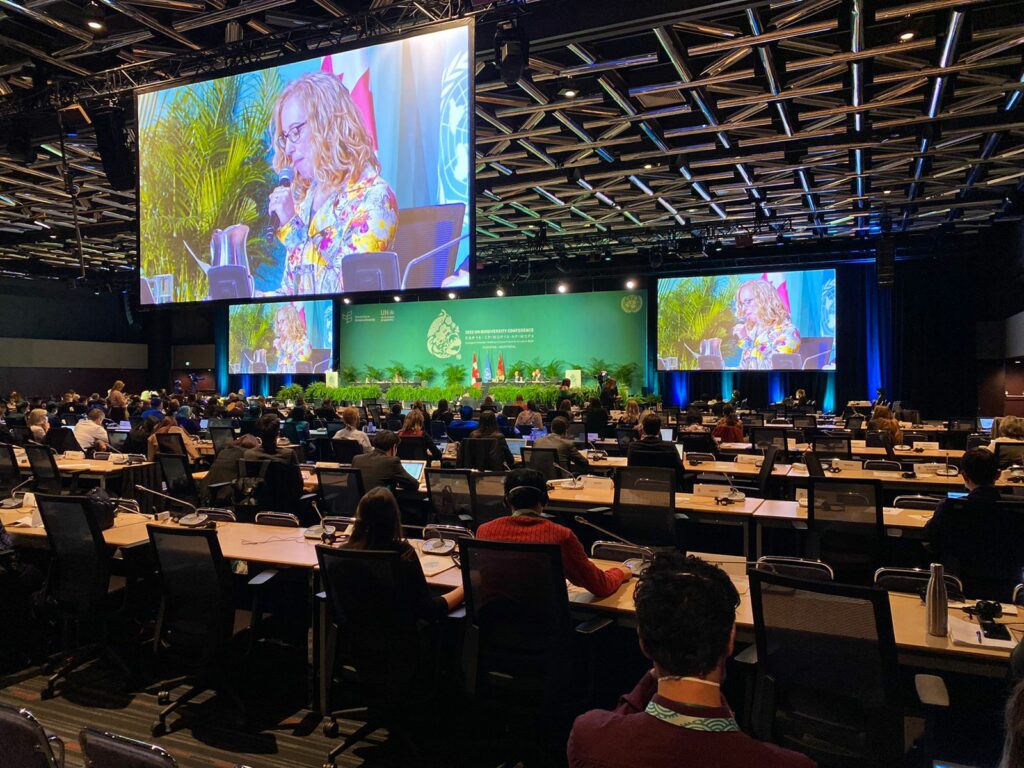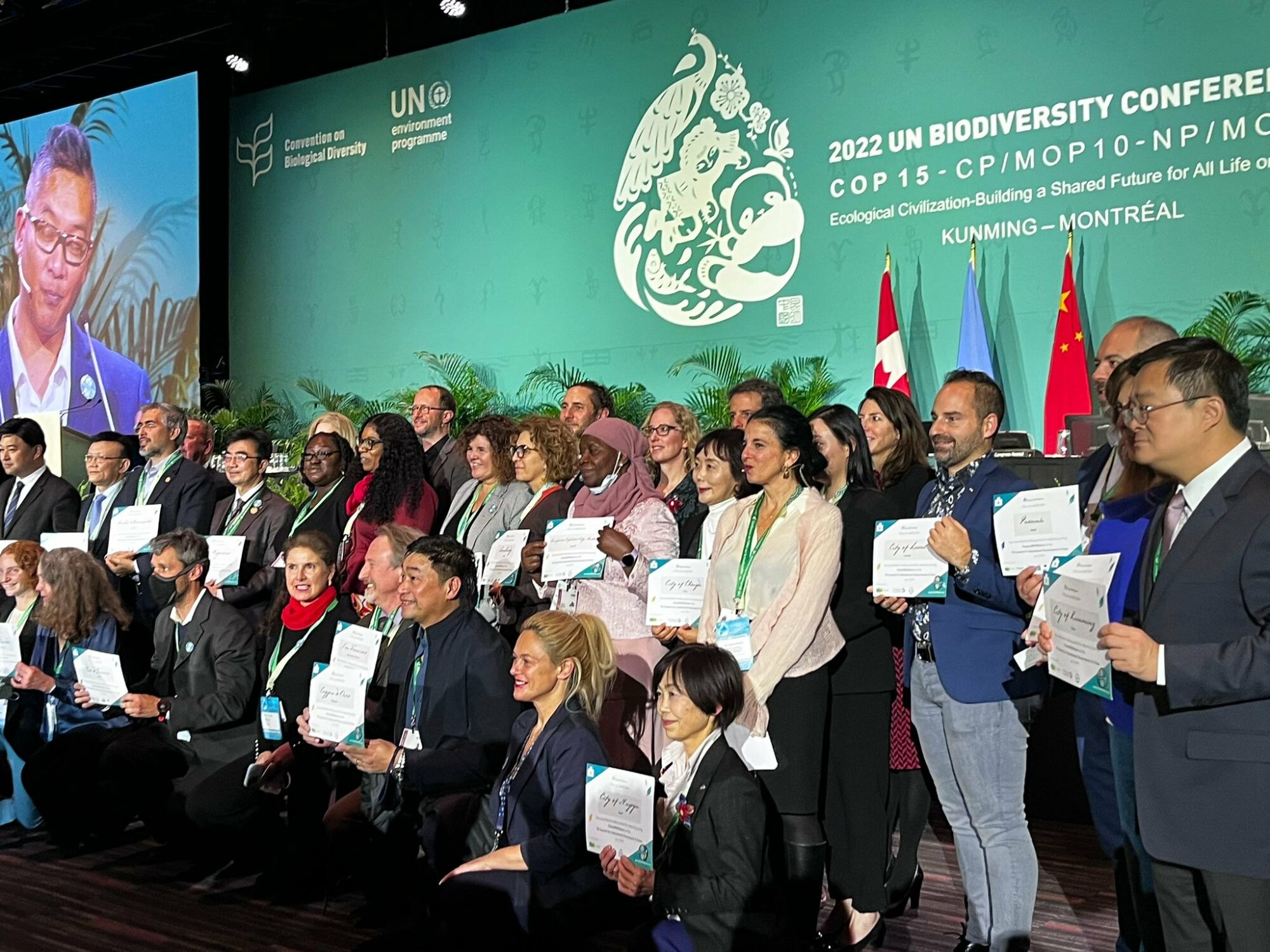The Kunming-Montreal Global Biodiversity Framework adopted for urgent and transformative action #ForNature
Regions4 celebrates the whole-of-government approach and the updated Decision and Plan of Action on Engagement with #subnational governments!
The second part of the United Nations Convention on Biodiversity (CBD) 15th Conference of the Parties (COP15) took place in Montreal, Canada, (7-19 December 2022). After two years of challenging negotiations, a new Global Biodiversity Framework was adopted that aims to reverse biodiversity loss and set humanity in the direction of living in harmony with nature by 2030, with clear indicators to measure progress.
Among the most significant targets set for 2030, are to protect 30% of the Earth’s lands, oceans, coastal areas, and inland waters; reduce by $500 billion annually harmful government subsidies; cut food waste in half, restore at least 30% of degraded terrestrial, inland waters, and coastal and marine ecosystems, and assure $30 billion annually in financing from developed countries to implement the new framework in least developed countries, small island developing states, and states with economies in transition.
An unprecedented number of Regions4 members were present at COP15, including the governments of Catalonia, Guanajuato, Jalisco, Lombardy, Parana, Quebec, Rio de Janeiro State, Sao Paulo State, Scotland, Wales and Yucatan; forming a delegation of nearly 50 regional representatives.
The Kunming-Montreal Global Biodiversity Framework: Significance for Subnational Governments
After weeks of intense negotiations, the second part of CBD COP15 resulted with the adoption of the “Kunming-Montreal Global Biodiversity Framework”, the purpose of which:
“(…) aims to catalyze, enable and galvanize urgent and transformative action by Governments, subnational and local governments, and with the involvement of all of society to halt and reverse biodiversity loss, to achieve the outcomes it sets out in its vision, mission, goals and targets, and thereby to contribute to the three objectives of the Convention on Biological Diversity, and to its Protocols.”
The important reference to subnational governments in this key section of the framework speaks of the willingness of the Parties to the Convention to continue to consider subnational and local leaders as key allies for this tremendous task. Additionally, the new framework, including its 4 goals and 23 targets, emphasizes a ‘whole-of-government’ and ‘whole-of-society’ approach. The considerations on implementation refer to the fact that, “Its success requires political will and recognition at the highest level of government, and relies on action and cooperation by all levels of government and by all actors of society”.
Moreover, some of the targets also relate specifically to subnational governments. Target 12 is related to urban areas, seeking to: “Significantly increase the area and quality and connectivity of, access to, and benefits from green and blue spaces in urban and densely populated areas sustainably…”. And Target 14, on mainstreaming biodiversity and its values “into policies, regulations, planning and development processes”, among other areas, clearly indicates that this should be conducted “within and across all levels of government and all sectors.”
Another key outcome of the CBD COP15 for regional and subnational governments is the formal adoption of an updated Decision and Plan of Action on the Engagement with Subnational Governments, Cities, and Other Local Authorities to Enhance Implementation of the Post 2020 Global Biodiversity Framework. The Decision and the Plan of Action resulted from a series of consultations known as the Edinburgh Process, led by the Scottish Government and partners including Regions4. The document includes a detailed list of how subnational and local governments are to fulfil their role in seven action areas, including: implementation of biodiversity strategies and action plans; collaboration between all levels of government and mainstreaming; resource mobilization; capacity building; communication, education, and public awareness; decision-making and monitoring and reporting.
This official CBD COP15 Decision document highlights the need of using online commitment and reporting platforms, such as RegionsWithNature and CitiesWithNature – both also launched at COP15 -, where subnational governments can report on, and track progress against, their commitments to contributing to the implementation of the post-2020 global biodiversity framework and national biodiversity strategies and action plans.
Subnational leadership at COP15
Subnational leadership was underscored by the fact that the Edinburgh Declaration arrived at COP15 with the explicit support of 308 subnational and local governments across 51 countries, and the endorsement of 3 national governments. The Edinburgh Process partners, particularly the Scottish Government, Quebec, Regions4 and ICLEI, organized an official side-event at COP15 on December 10, to celebrate its success and to recall the importance of the subnational and local constituencies for the successful implementation of the framework.
The side event considered best practices and emerging policies at the subnational level from Edinburgh Declaration signatories, and showcased how the Edinburgh Process has bridged the climate and nature agendas by highlighting the ways that actions at all levels of government can deliver nature positive goals:
“The Edinburgh Declaration sends a strong message: collectively, we subnational governments, stand ready to implement an ambitious global biodiversity framework and play our part in delivering the transformative action needed to halt biodiversity loss”.
Ms. Lorna Slater, Minister for Green Skills, Circular Economy and Biodiversity of Scotland.

Ms. Lorna Slater, Minister for Green Skills, Circular Economy and Biodiversity of Scotland at the 7th Summit for Subnational Governments and Cities, in Montreal.
At COP15, in the days prior to the adoption of the new framework, Regions4 focused on supporting and co-organizing strategic events that catalyzed regional leadership, upscaled subnational government efforts internationally, and shared their key messages. Specifically, Regions4 co-organized 4 events, and co-hosted the 7th Summit for Subnational Governments and Cities (December 11-12) alongside ICLEI and the hosting governments – the city of Montreal and the government of Quebec, as well as a networking cocktail for members and partners.
Additionally, Regions4 facilitated 29 member interventions at 7 separate events, including the intervention of 18 high-level regional representatives at the 7th Summit for Subnational Governments and Cities. Regions4’s main goal was to give visibility to the efforts and initiatives that are already taking place at the regional level of government, and to showcase action on the ground to inspire the Parties to the Convention and stakeholders present on the benefits of scaling-up these inspirational regional initiatives.
Throughout COP15, regional governments showed that they are key actors in the protection of biodiversity and that they are already leading on the implementation of nature-positive actions in their regions. This included not only wide-ranging examples of concrete actions, but important announcements as well. The Government of Quebec announced their ambitious new plan for nature conservation in the region; The “Plan Nature”, announced at the opening of the COP15, has a 650-million-dollar budget, including 344 million over the next 4 years. This pioneering plan has an unprecedented budget in Quebec’s history, and will enable the region to do its part in achieving the global targets, particularly Target 3 on protecting 30% of its territory, oceans, coastal areas, inland waters by 2030.
Regions4 was also able to provide financial support to enable the participation of one delegate from Latin America and launch two press releases featured in 16 newspapers in 6 countries. For a detailed analysis of Regions4 presence at COP15, please visit the Regions4 full outcomes report, available here.
The way forward
The launch of RegionsWithNature and its featured tool, the Case Study Database -a Regions4-led project- will be fundamental in the coming months, as the Parties to the Convention continue to deliberate on the reporting and monitoring elements of the Kunming-Montreal Global Biodiversity Framework.
Both initiatives, free and open to all regions of the world, will be welcoming new members all throughout the year so please consider joining if you are interested in connecting with regional and subnational leaders and their partners from around the world; need to access tools and resources on nature-based solutions, ecosystem restoration, biodiversity conservation and other thematic areas; and, want to share and monitor progress against your commitments to achieving the global biodiversity and ecosystem restoration goals.
Additionally, Regions4 will continue to co-coordinate, together with Quebec, and further promote dialogue with the members and partners of the Advisory Committee for Subnational Governments to the CBD (AC-SNG), a strategic space for connecting the voice of subnationals directly to the negotiation process. Regions4 will also continue to closely follow the negotiations and attend the meetings of the subsidiary bodies of the CBD – the Subsidiary Body on Scientific Technical and Technological Advice and the Subsidiary Body on Implementation – as they will continue to refine and negotiate the scientific and monitoring foundation upon which the framework is based.
To learn more about our efforts, for more information about our events and better understand the results of the CBD COP15, read our “Regions4 Outcomes and Contributions at the CBD COP15” report here.
Links:
- Download Regions4 CBD COP15 Outcomes Report
- RegionsWithNature
- Case Study Database http://regions4.org/csd



